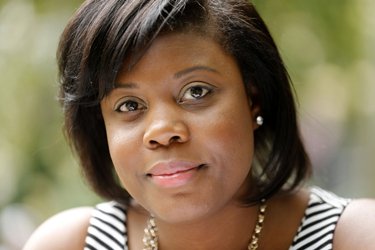
Former “Professional Wedding Vow Writer” Charanna Alexander, now editing The New York Times Weddings section.
Christine Rosen, in Commentary, reports that the flood waters of insane Wokery have swept away another cultural landmark: the Sunday New York Times Weddings section.
The New York Times Weddings section, once infamously described in an episode of Sex and the City as “the women’s sports pages,” recently announced that it is questioning whether marriage is worth saving at all. “The Weddings Section Asks What It Means to Be Committed in 2022,” the headline announcing the section’s new focus noted, but the question was clearly rhetorical. Its new editor, Charanna Alexander, has already begun to “move away from the traditional Times wedding announcement” and noted that the “evolved Weddings section” would now be “exploring what it means to be committed in 2022, whether or not that includes marriage.”
Evidently only rubes think marriage is an institution for raising families and ensuring social stability. Times readers know better. “I really came in wanting to change everyone’s perception of the types of couples we feature,” Alexander said. “I wanted to not only make it more racially diverse, but also culturally diverse. I just really wanted to look for holes in our previous coverage, so that we can start to be a section that everyone can see themselves in.”
If you are an average person who sees yourself in a traditional marriage, the Times is putting you on notice that your status has been downgraded. The traditional Vows column that runs every Sunday still features a story of a single couple, but the shorter traditional announcements that were long the meat of the marriage pages are no more. Instead, readers are invited to submit their stories for the diminutive Mini-Vows section, which might more accurately be called Struggle Love, since that is what it elevates. As Alexander puts it, “the common thread of all of our Mini-Vows is that the couples all share some moments of transition where they have to overcome something together.”
Presumably the Mini-Vows approach is meant to yield a section less apt to celebrate the predictable joining of family assets and/or Ivy League résumés. But what it has produced in its stead is a lot of emotive hyperbole and oversharing, the overall effect of which is remarkably banal. The new submissions process asks couples “to really dig deep into their love story and tell us what makes them click: how they came together; what their relationship means to them, and maybe even the people in their lives; and how they’ve changed since they’ve been together.” Alexander adds: “We’re just asking couples to go a little deeper, which gives us a better sense, once we get a submission, to say, ‘Hey, this is really inspiring.’” Merely getting married is too vanilla for the Times reader. Now, your story must be akin to a TED talk; it must “inspire” others.
Sod the diverse, every obnoxious, annoying, self-entitled one of them.
HT: Karen L. Myers.
————————————





OneGuy
I think there is a good chance we will see unchecked inflation, a real estate and market crash and a great depression 2.0 all at the same time. I’m not sure what will happen to the world and to our own country but common sense tells me that the super benevolent welfare state will disappear and at best be replaced by a bare bones bread line. A hate to be a chauvinist but this will change the view of marriage for most women and men. Jobs and food will be hard to get and the whole purpose of a nuclear family will suddenly be obvious to everyone.
I could be wrong. The wizards at the FED might find a way this time to print our way out of this but I don’t know how.
Please Leave a Comment!